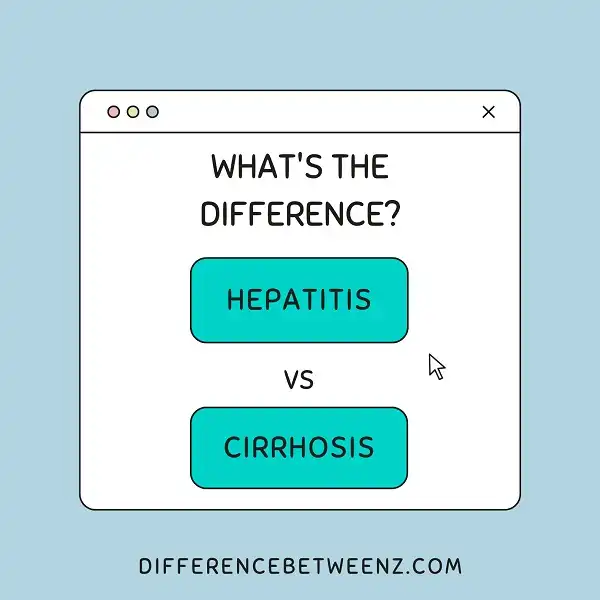Hepatitis and cirrhosis are two common conditions that can affect your liver, but they are much different from one another. It is important for anyone who has liver health concerns to understand the differences between hepatitis and cirrhosis so that an appropriate treatment plan can be designed by a medical professional. In this blog post, our experts will explain what illnesses these terms apply to as well as the causes of each condition, along with outlining available treatments for both types of disorders. So if you’re looking for detailed information on the difference between hepatitis and cirrhosis, then read on!
What is Difference between Hepatitis and Cirrhosis?
Hepatitis is an inflammation of the liver. It has a variety of causes including viral infections, autoimmune conditions, and the misuse of alcohol and/or drugs.
- Hepatitis can be spread through contact with infected blood or body fluids such as semen and saliva, sexual contact, contaminated food or water, and from mother to child during birth.
- Hepatitis can lead to serious liver disorders including cirrhosis and cancer. Symptoms may include fever, fatigue, loss of appetite, nausea and vomiting, abdominal pain, dark urine, jaundice (yellowing of the skin), and joint pain.
- Thankfully there are treatments available to manage Hepatitis; however, prevention is still the best method for protecting oneself against Hepatitis so it’s important to take necessary precautions like practicing safe sex and getting vaccinated when possible.
What is Cirrhosis?
- Cirrhosis is a condition caused by long-term, progressive damage to the liver. It can affect how the organ works, and can even lead to portal hypertension, hepatic encephalopathy, and hepatorenal syndrome.
- Cirrhosis typically has no symptoms in its early stages. As it progresses, however, a person may become jaundiced or have puffiness around their eyes or legs due to fluid retention.
- Cirrhosis is an irreversible condition and can be life-threatening if not managed correctly and promptly. With proper treatment and cessation of dangerous habits, such as alcohol consumption and smoking, Cirrhosis can be kept under control over time.
Difference between Hepatitis and Cirrhosis
Hepatitis and cirrhosis are both serious diseases that can have long-lasting effects on the human body. Hepatitis is an inflammation of the liver as a result of infection by one of five different types of viruses; whereas, cirrhosis is a much more serious and often irreversible condition caused by long-term damage to the liver from other sources, such as excessive drinking or Hepatitis.
Hepatitis can often be treated if it is caught in time, while cirrhosis can cause only limited damage if detected early primarily due to scarring of the organ. Because of this, prevention and early detection should be taken into account when discussing Hepatitis and Cirrhosis. Understanding the differences between Hepatitis and Cirrhosis could ultimately save lives.
Conclusion
In other words, hepatitis can lead to cirrhosis, but not all cases of cirrhosis are due to hepatitis. As you can see, both conditions are serious and should be diagnosed and treated as soon as possible.


